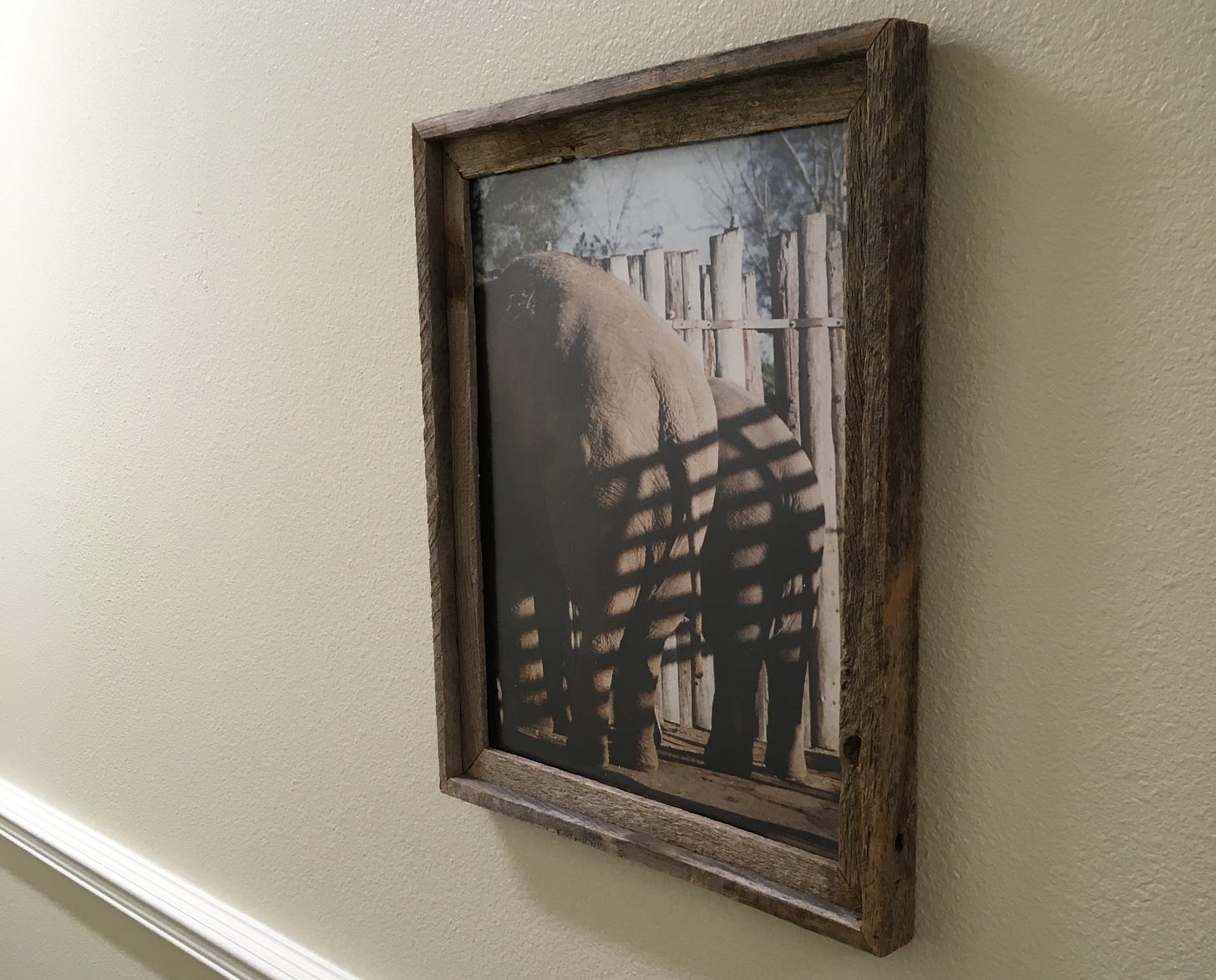Saying Goodbye to My Therapy Fears
Therapy has saved me, and I'm done feeling ashamed about it.
I’ve never googled my therapist, and I never will. When I first started going to her, three years ago, I was 23. I was five months into a job that I was great at when I was trying, and bad at when I wasn’t. I’d stay up for hours thinking about how shit I was at my job and how no one could depend on me, and the anxiety would keep me up all night. And then I’d oversleep, and the vicious cycle would continue. And then I’d feel guilty and pathetic and have meetings with my boss and my boss’ boss, and I guess I’m just lucky no one got tired of my shit fast enough to fire me.
I started going to therapy because I thought it would help address whatever these problems were. I don’t have notes from that time despite my therapist suggesting I keep a journal (I am the writer who hates writing). And because I don’t have notes and my mind has been, in my nonprofessional opinion, addled by years of trauma, I don’t remember if my therapist ever formally diagnosed me as having depression.
But we talked about depressive episodes a lot, and things I could do to maintain a routine to cope and make myself feel better. We still talk about my depressive episodes, but three years in, they’re far less frequent.
To the best of my knowledge, going to therapy helped me with this work situation, though we talked about much more than my inability to work. What I do remember is crying at my end-of-year performance review (which took place over video) with my boss and my boss’ boss, after they had praised me for turning my year around.
Really, I remember crying because the validation didn’t make me happy like I thought it would. I thought being good at my job would bring me some kind of life fulfillment, and it didn’t, and that realization crept into my consciousness like, “oh fuck oh fuck oh fuck.” So I thanked them and I cried and I left the video call and cried some more. We worked on that, too.
At that point I was seeing my therapist once a week, and around that time we decided to ramp down my appointments to twice a month. I trust her, a lot, and that’s why I don’t google her. Because I know that I’m very judgmental, and if I started scrolling through her Instagram or looking at whatever content she keeps public on Facebook, I might start judging her, and that scares the shit out of me. I trust her, because I have no reason not to, and so I’d rather not go looking for one. Partially because she knows me too well at this point and I’d hate to begin this process again with someone else, but also because she me took too fucking long to find.
I was in a crisis the first time I wanted to talk to someone, about five years ago. I was a senior in college and couldn’t bring myself to work, for my classes or internships (this is a major symptom of my depression, it seems). I felt desperate, but when I called up my university’s mental health counseling center, I was told I needed to schedule an evaluation a few weeks out before I could actually see a therapist. And so I let it go — I needed help immediately, not weeks later.
Even though I was in immense pain, I’m not sure I was ready for therapy then. Despite being in an environment that — at least in theory — valued mental health, therapy still seemed intimidating, and maybe too much work. I thought my problems might have stemmed from previous experiences, but I wasn’t really interested in processing them, because it was much easier to let my trauma continue to fester than to seek long-term help. That, on top of not wanting to draw my parents’ attention to whatever “problems” they’d assume I had by using my mom’s shitty work insurance, made me wait nearly another two years before I tried getting help again.
But when I finally committed to getting help — facilitated by having my own high-premium work health insurance — it took fucking forever. I’d spend hours cross -referencing between my insurance portal list of covered therapists and the Psychology Today listings of Austin professionals, and watch as my options narrowed. The Venn Diagram of therapists who specialized in what I needed help with and who also took my insurance was two nearly perfect circles.
I saw one other therapist for three sessions before my current therapist. She was, to be dramatic, the fucking worst — an older white woman whose therapy style involved peppering me with inappropriate questions about the traumatic events I opened up to her about. I won’t get more specific than to say she asked, “Did you at least enjoy it?”
I had about two sessions of EMDR therapy where she had me hold two pulsating sensors in my palms and told me to envision a beach, and that I was surrounded by, like, love, or the image of letting love into my heart I think? Eventually, I decided that this really wasn’t for me. I was uncomfortable the entire time I saw her, and heard nothing back from her when I emailed her to cancel my future appointments. The best part about that experience was the framed portrait of two elephant butts in the hallway outside of her office (pictured below).
My therapist’s call was a saving grace. Before I quit on the EMDR lady, my current therapist called to tell me she could take on another client, so I jumped. And I’ve trusted her ever since, even when I wasn’t ready to take her advice.
It’s a shame that I haven’t documented anything about my therapy process, because I have very little to look back on to gauge my progress. I haven’t bothered looking in the few written pages of my many mostly-undisturbed journals — again, I’m a journalist, not a journal-er — but I do have a decade-old Tumblr account that I finally abandoned within the past year. I gave it a flip through to see if I could find anything that even vaguely mentioned therapy, and came up with few golden tidbits:
11:56 pm / 7 June 2017
I am starting therapy tomorrow ha ha wow!!
7:02 pm / 13 July 2017
I went and saw a new therapist today and she feels a lot more amazing than the other person I’m seeing but she had me talk about myself a lot and now! I! Feel! Like! Shit! For! Reliving! The! Past! 5! Years! In! 50! Minutes!
6:10 pm / 16 August 2017
I told my therapist I was going to stick to my routine and go to the gym but I was feeling shitty when I left so I went and got boba tea (writer’s note: pictured below) instead ha ha :-)
Aside from those, there’s one other post about my therapist telling me not to talk myself out of liking this guy I was dating, who ended up ghosting me a month or so later. His mistake, not my therapist’s!!! But even given what I found, I was looking for more. Something to show that therapy had helped me in a way that I could tangibly measure. And I was feeling that I’d come up short, until I looked a little further back into my blog and noticed other things.
Things like, I slowly stopped posting about how much I hated myself, or sharing about my self-destructive behaviors, or all the other ways I felt like a failure. My posts of negative self-talk became infrequent, and then so did all posts generally. The absence of posts about a particular person reminded me that my therapist helped me leave my toxic relationship with them for good.
Even without trying to take stock, I know my therapist has reaffirmed my feelings when I talk about sexism or racism at work, and helped me rehearse advocating for myself, and pushed me to express and care for myself in ways that I wouldn’t have done on my own.
And somehow, despite all of the ways that therapy has helped me expand as a person, and has turned me into a convert in terms of believing that everyone, everyone could use some form of counseling, I’m still often afraid to talk about therapy out loud, because I know what I used to think about people who went to therapy, and I’m afraid of being misunderstood in those ways, too.
I see it in my parents. When my sibling and I told our mother that we both saw therapists, she moaned, wondering how she had failed us as a mother. I had to redirect her by rudely saying that not everything we do revolves around her (our mother’s contribution to our psychology was a hard conversation for another time.) When we told her that she, a woman whose pragmatism has held this family together since she immigrated to the U.S. nearly three decades ago, could benefit from therapy, she moaned more that her problem is that she’s poor, and if she gives a therapist money, that just makes her more poor.
When I told my dad a few weeks ago that I needed to get off the phone because I had a video call with my therapist, he very surprisingly replied, “Oh, well I didn’t realize you needed therapizing. I hope you get better soon.” For decades before that, he insisted to us as children that psychologists were quacks, and that they only become psychologists because they want to know what’s wrong with themselves. His response was progress, I guess, but still felt like he thought something was wrong with me, and that I was going to therapy to be “fixed.”
When I told him I felt helped by paying someone to talk about things that bothered me, he told me, “Well, that’s what I have you for.” Between him and my mom, this is more of an honest assessment than a joke.
What struck me more than his response, though, was my realization that I’d been in therapy for three years and had never brought it up to my dad, who I saw almost weekly before the pandemic. And it made me realize that, even despite the relief and growth it’s brought me, I’m still so ashamed to be open about it, even when I know better than to be.
I remember being gobsmacked when a friend, who I ran into on the street when I was visiting New York a few months after my crisis, told me at full volume that she was on her way to see her therapist. Like it wasn’t a secret shame, or an itinerary reserved for your close confidants. She was really out here telling people who she hadn’t seen in years that she was actively seeking mental health treatment.
And I wish I could be as open as she was with me, but even when I talk to friends who I know I see a therapist about going to therapy, I feel like I’m committing a sin. Like I’m inviting people to wonder what could have gone so wrong in my life that I’ve needed therapy. Or opening up a whole other cabinet of questions begging to be asked by people too polite to say anything at all. Talking about therapy feels like I’m saying the thing that’s supposed to sound radical and liberating when said aloud, but still feels really unsafe to say at all.
I can’t tell if this is my problem or the problem of the people around me. My boyfriend’s the only person who treats me normally when I tell him I have a session, telling me to have fun before I sequester myself into another room for an hour, or asking me how it went when I’m done. But he’s also the only person I tell about my sessions regularly. The chicken or the egg, I guess.
I’ve been incredibly privileged to have spent the last three years in therapy, especially now that my medical costs have skyrocketed this year being an employed contractor and not in a full-time salaried position. At least I have the money to cover those costs, really. But the stigma of therapy won’t go anywhere until we have Medicare for All, the realignment of mental healthcare as preventative care instead of specialized medicine, and the full embrace of a telemedicine system that provides mental healthcare to everyone regardless of location.
Because even when I was ready for therapy I’m not sure what I would have done had I not found a therapist with the cultural competency to validate and affirm my experiences with sexism and racism. I would not be surprised if that first therapist I first tried surely did not. Without my therapist, I might very well still feel like a useless piece of shit whose laziness consumes her.
Despite its continued inaccessibility for many people, I can’t recommend therapy enough. It didn’t take three years for me to feel better, but I’ve wanted to continue this relationship for so many years because it’s helped me work through newer roadblocks as they arrive, and revisit longer-term journeys toward healing when I’m having trouble coping.
When I told my therapist I was writing this piece (she will not be reading this, btw!), she asked me if there was anything I wanted to change at this three-year point. I said I wasn’t ready to see her less frequently — simply too much shit happens within two weeks that I can’t wait to address two weeks later. But I assume, at some point, I’ll feel ready to move to monthly appointments, then bi-monthly, then just with appointments for specific life events, or something. Until then, I take comfort in knowing that through rounds of layoffs and my interpersonal communication problems and depressive episodes, my next appointment is less than two weeks away.
Photo via Matthew Paul Argall/Flickr






As a guy, it can be very difficult to admit there is an issue that you are having that requires outside help. You should be able to handle it yourself, bounce it off a friend, "walk it off", or something to get yourself right. But I've been seeing a therapist for years, and was fortunate (on advice from a girlfriend at the time, many years ago) to take advantage of free sessions through the UC system in CA, and I can't recommend it enough.
Since I'm a big sports guy, and played for years, the context that works best for me is a coaching relationship. Any coach I've ever had is out there to help me be my best self...on the field, on the floor, in training, etc. So, I took in that coach mindset into my own sessions...my therapist is there to help me see my own blind spots, so I can be my best self (whatever that is at the time). Having that context, my therapist as a coach, really eased any concerns I had about going into therapy.
So now I see my coach in the locker room (our sessions) then go back out into the field of life. It works really well for me. Sam, I appreciate you putting this out there. I don't share this with most people, but the more we do, the less of a stigma there is. Thank you for your courage.
Thank you for sharing this. I've had several therapists over the years and you're totally right that finding a good fit is necessary. They help, which is why your point about Medicare for All so that everyone can see one is so important, as is decreasing mental health stigma--which writng like this does.